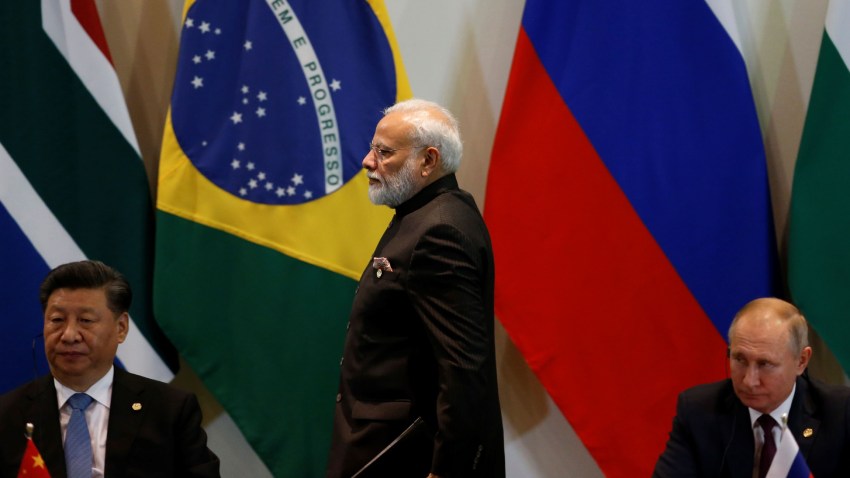Hello everyone. Today at WPR, we’ve got stories on the potential expansion of BRICS and why the U.S. should end the war on terror.
But first, here’s our take on today’s top story in the news.
Pakistan: Former Pakistani PM Imran Khan was arrested Saturday after being sentenced to three years in prison for illegally selling state gifts and concealing the profits. The verdict likely means that Khan will be unable to run in upcoming general elections expected this fall. (New York Times)
Our Take: Khan’s arrest is the latest battle in his war with the Pakistani military, which often calls the shots in domestic politics and whose support Khan relied on to gain power. Their falling out began in April 2022, when Khan was ousted in a no-confidence vote that he said was engineered by the armed forces, reportedly due to disagreements over high-level military appointments.
Since then, Khan has been using public protests to mobilize his base of support, in the hopes of returning to power when elections are eventually held. But his ongoing criminal prosecutions for corruption, which he says are politically motivated, have increasingly derailed that effort. Khan seemed to have won a round last May, after the Supreme Court overturned an arrest that month on corruption charges. But his apparent triumph was short-lived, as the military subsequently targeted leaders of his party and other high-level supporters with arrests.
The chilling effect of that crackdown is clear from the relatively muted reaction to Khan’s arrest this weekend, compared to the violent, nationwide protests and attacks on military installations that erupted in May.
Still, as Arif Rafiq wrote in June, the military’s victory in its battle against Khan could similarly end up being Pyrrhic. Amid an ailing economy that was bailed out by the IMF just last month, the military may find itself on the hook for the country’s problems, which are driving many young Pakistanis to flee the country in search of greater opportunity abroad.

Generally speaking, when an international organization finds itself debating its plans for membership expansion rather than more substantive agenda items, it is a sign of a group that lacks a clear mission and direction.
That is certainly true in the case of the BRICS, comprising Brazil, Russia, India, China and South Africa.
But as James Bosworth writes, the current debates within BRICS over expansion also underscore the differences in how its members view both the benefits they receive from the organization and their future role in the international community.
Since the launch of the “great power competition” framework, U.S. policymakers seem to have moved on entirely from the war on terror, focusing instead on countering China and Russia. But it would be a mistake to consider the war on terror as solely in the past.
As Aude Darnal writes, while great power competition may be dominating the political agenda in Washington, now more than ever, the U.S. public must redouble its efforts to push Congress and the Biden administration to end the forever war on terror.

Question of the Day: Which ECOWAS member would be most likely to lead any military intervention in Niger to reinstate the deposed president?
Find the answer in the latest WPR Weekly Quiz, then read Alexander Clarkson’s column on the future of security in West Africa.

The government of the Philippines summoned China’s ambassador Monday over the Chinese coast guard’s use of water cannons in a confrontation with Philippine vessels in the disputed South China Sea over the weekend.
In his first year in office, Philippine President Ferdinand Marcos has shifted Manila’s foreign policy alignment away from China and back toward the United States. As Richard Javad Heydarian wrote in February, though, the pivot is likely to face opposition from pro-Beijing constituencies, as well as potential reprisals from China.
Marcos Is Bringing the Philippines Back Into the U.S. Fold
Feb. 15, 2023 | After six years of acrimonious US-Philippines relations, President Ferdinand Marcos has upgraded defense ties with Washington. Read more.
*****
A recent in-depth Washington Post report details the toll that mining for cobalt—an essential mineral for electric vehicles—is taking on workers and communities in the Democratic Republic of Congo, even as automakers and mining companies say they adhere to international safety standards.
The problem is only likely to become more common. As Teresa Kramarz wrote last year, the wider shift to renewable energies relies heavily on the extraction of minerals and metals that are primarily found in Global South countries. As a result, the green transition risks reproducing the damage historically associated with the mining sector.
The Green Energy Transition Has an Extractivism Problem
Nov. 15, 2022 | Accessing the critical minerals essential for developing low-carbon energy options brings us to the dark side of the green transition. Read more.
That’s all for today’s Daily Review. Coming up, we’ve got coverage of Spain’s regional nationalist parties and tips for how to be a policy wonk.
Have a great day,
Jakob Cansler
More From WPR
- Paul Poast on a potential alien visit to Earth.
- Saskia Brechenmacher and Caroline Crystal on the global backlash against abortion rights.
- Chris Olaoluwa Ògúnmọ́dẹdé on the coup in Niger.
- Frida Ghitis on a Bolivia-Iran defense agreement.

